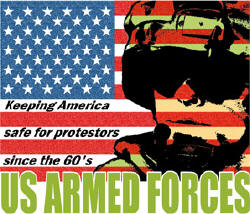I posted this originally in mid-November 2005, in regards to the Michael Newdow escapades. Seems not much has changed since then, only now it's the atheist versus the Mt. Soledad cross. Why is it so important for this
small minority of people with an unreasonable fear of anything iconically religious to abolish all things traditional just because it may have a cross or the word "God" or some other symbol that could possibly be construed as religious in any way. I wonder what it is they fear so much they feel the need to abolish any appearance of it?!

The ACLU is on a crusade (and yes, I used that word deliberately) to banish religion as completely as they can from our everyday lives. No religious symbols on or around government buildings or public schools. No references to religion in those places either. And why is this? Because they believe that the First Amendment specifically says that there should not be anything religious within the government. Yes, that dreaded "separation of church and state" club that they use to beat over the heads of US citizens or any city, business, or school that would dare to show religious symbols or icons in any public way.
Here is the First Amendment:
Amendment I - Freedom of Religion, Press, Expression Ratified 12/15/1791.
"Congress shall make no law respecting an establishment of religion, or prohibiting the free exercise thereof; or abridging the freedom of speech, or of the press; or the right of the people peaceably to assemble, and to petition the Government for a redress of grievances."
Now, I'm not a historian or a constitutional law professor, but I'm pretty sure that I understand history and the way I read this is that Congress cannot set up a religion and then force citizens, by law, to worship it. This goes back to Henry VIII. When he did not get his annullment he broke with the Pope, created the (Protestant) National Church of England, and forced that religion on the citizenry, thereby banning Catholicism from England. Since Catholicism was banned, Henry VIII and the nobles decided they wanted the land that the monastaries were on, so they took those as well.
Now, back to the present. I certainly don't remember Congress creating and enforcing a religion on me. Do you? Yes, there is the phrase "In God We Trust" on our money (since 1864), but it is not a specified Catholic, Protestant, Muslim, Jewish, Lutheran, Baptist, Hindu, Buddist, or any other organized religion's god.
The ACLU would have you believe that the use of the word "God", in any respect, in any public building, is wrong and unconstitutional. Okay, then, shall we destroy all the historical buildings across the country because the cornerstone, mantel, lintel, facade, stain glass window, statue, floor medallion, city seal, et al show the word "God" or any other religious figure? Shall we then change the names of cities such as Los Cruces (the crosses), Corpus Cristi (body of Christ), Bethlehem, Sacrmento (sacrament), Los Angeles (the Angels), etc. because they refer to a religious belief? When will the ACLU stop?
Another thing. Do we not live in a country where majority rules? This is a democracy, right? Why is it that when 91% of the population of the United States believes in a god, we must bow to the wishes of the other 9%? I personally know professed atheists who could care less if "In God We Trust" is on money, or anywhere for that matter. If the above precepts are true, then why are we, as a society, allowing the ACLU and people like Michael Newdow to dictate if, how, or where historical symbols and icons can be shown and whether or not we can say "God" in public? We must ban together and fight back!
Acknowldgements: Painting called "Knowledge" in the North Hall of the Library of Congress from the website Scripture in Washington
Also sited: Human Events Online, US Department of the Treasury, Renaissance Faire and US Constitution
This was a production of Stop The ACLU Blogburst. If you would like to join us, please email Jay at Jay@stoptheaclu.com or Gribbit at GribbitR@gmail.com. You will be added to our mailing list and blogroll. Over 200 blogs already onboard.














